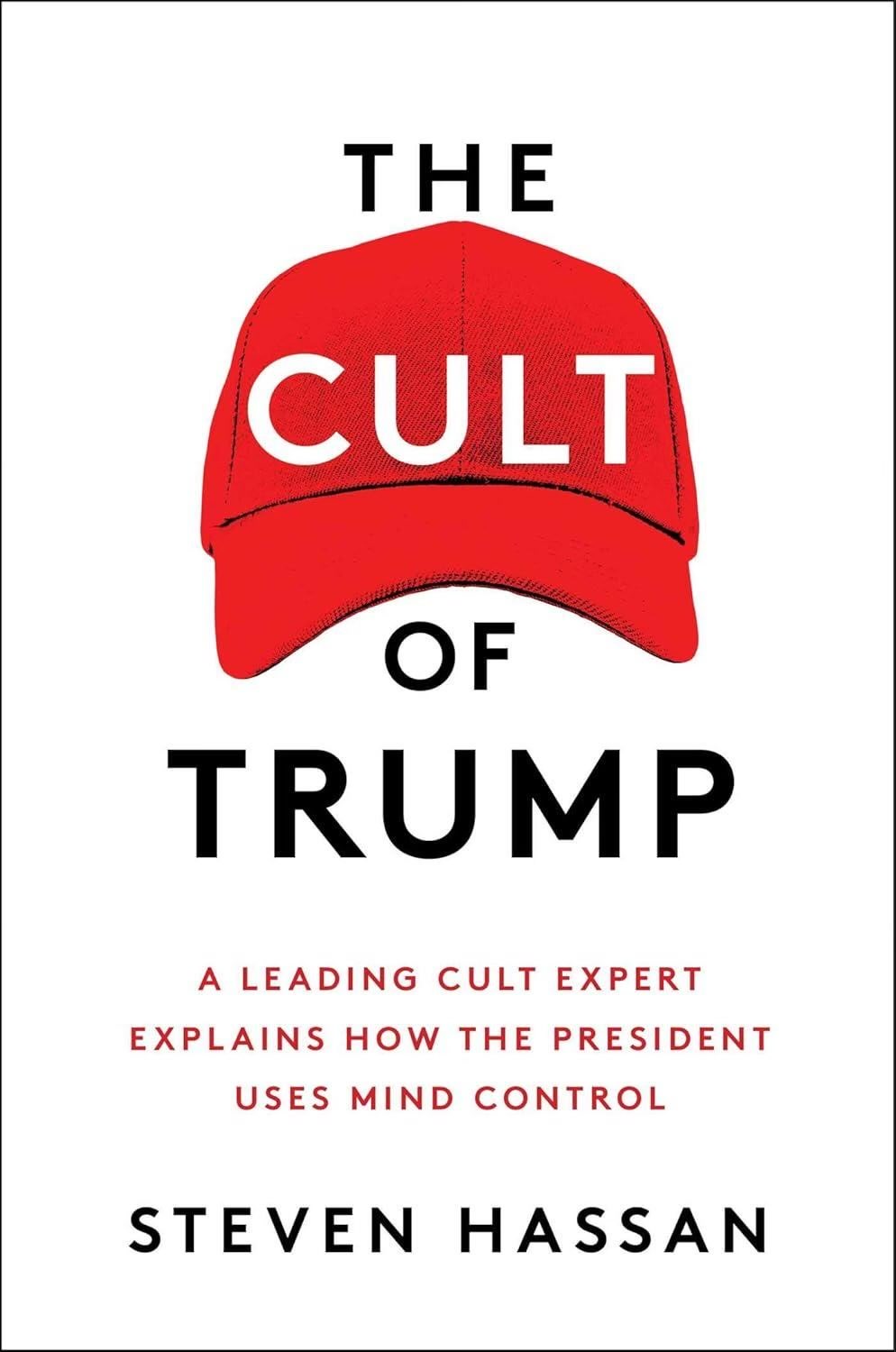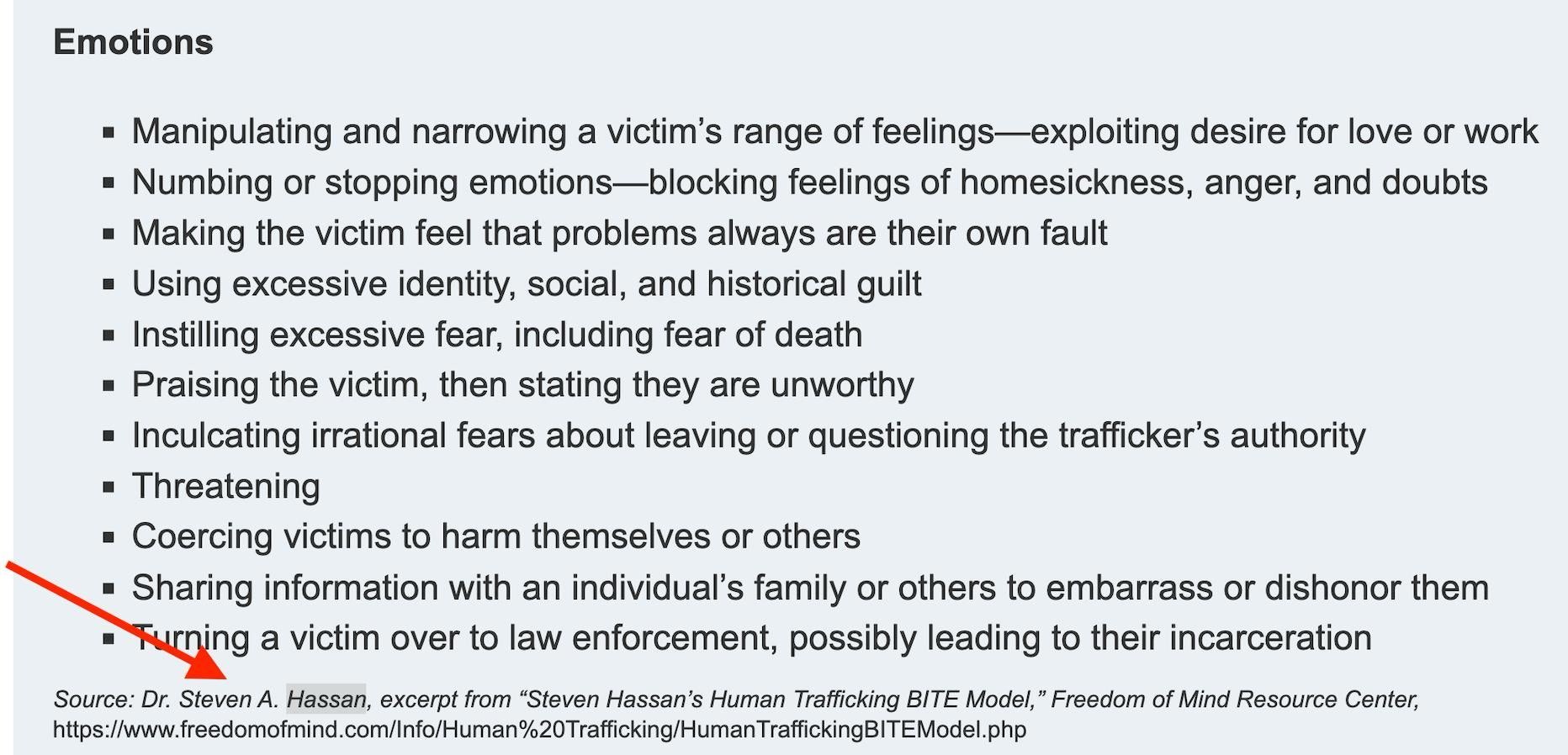
Annual Ad-Free Subscription… Join the Fight and Support Revolver Now…
Check out the new merch! — Donate…
Sign up for our email list… Stay on the bleeding edge…
In the middle of a quietly unfolding federal trial against former executives of a Silicon Valley wellness company called OneTaste, something truly extraordinary happened. Through the grind and determination of civil litigation, subpoena battles, and courtroom discovery, OneTaste stumbled onto a trail of evidence that doesn’t just raise questions about their own prosecution; it raises red flags about the very foundations of how federal agencies have been operating since the start of the lawfare era.
At the center of this discovery is a man named Steven Hassan, a self-described “cult expert” who authored a book titled “The Cult of Trump: A Leading Cult Expert Explains How the President Uses Mind Control.”
This is the man whose work is now featured on the FBI official website. And the man whose “BITE Model,” a subjective framework built on emotional, behavioral, and thought control, is being used to train FBI agents on how to identify “cult victims.”

This questionable training has been directly linked to criminal cases involving spiritual communities like OneTaste, where former members were encouraged to reinterpret their past experiences as “trauma” with the help of taxpayer-funded “victim services” and workshops hosted by Mr. Hassan.
According to documents reviewed by Revolver, federal prosecutors directed OneTaste’s defense attorneys to “look to the media,” specifically referencing a BBC podcast featuring Steven Hassan and several former members, saying it would help them understand the crime under investigation. That podcast, which is now the subject of a legal complaint by OneTaste, contains no formal criminal allegations or defined legal violations. It offers only personal stories, cult rhetoric, and opinion-based commentary. The only criminal allegation it puts forward is the story of Ayries Blanck, the government’s lead witness up until four weeks before trial. Once the defense proved she had perjured her testimony and fabricated false evidence in coordination with Netflix, prosecutors were forced to drop her.
And here’s what hasn’t been reported—until now.
According to sources close to the case and court-reviewed communications, Steven Hassan wasn’t just a media pundit or an FBI-approved “cult expert.” He was also the personal therapist for both Michal, the central figure in the 2018 Bloomberg article that triggered the FBI investigation (more on that shortly), and Ayries Blanck, the same witness who, according to court filings, allegedly worked with FBI Agent McGinnis to create fraudulent evidence.
In the Bloomberg story, Michal alleged she was “forced to marry” a man at OneTaste, a claim that, according to sources familiar with the case, is contradicted by substantial evidence showing the relationship was totally voluntary.
But it gets even more tangled. Bloomberg reporter Ellen Huet, who wrote the original article, requested to interview Hassan for a book she’s writing about OneTaste. He declined, citing concern about the lawsuit OneTaste filed against the BBC for their podcast, the same podcast where he appeared as the featured cult expert, and the same one prosecutors told the defense to “watch” to understand the charges.
Emails reviewed by Revolver confirm that Bloomberg reporter Ellen Huet reached out to Steven Hassan to collaborate on a book about OneTaste. Hassan declined, citing legal concerns tied to the BBC lawsuit and saying he had to be “careful.”
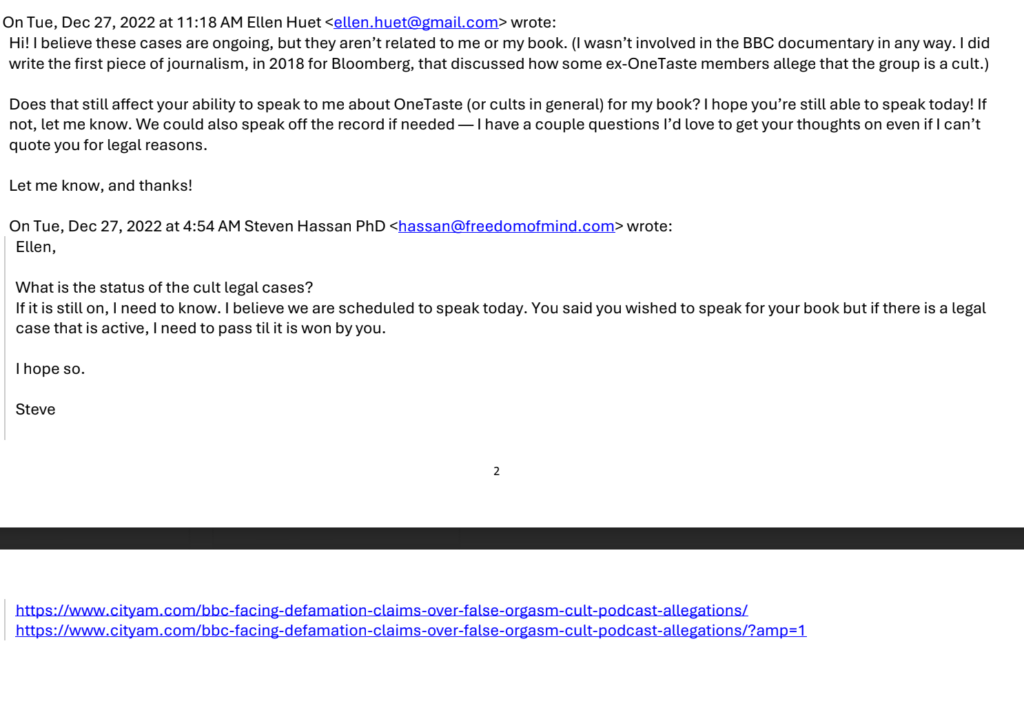
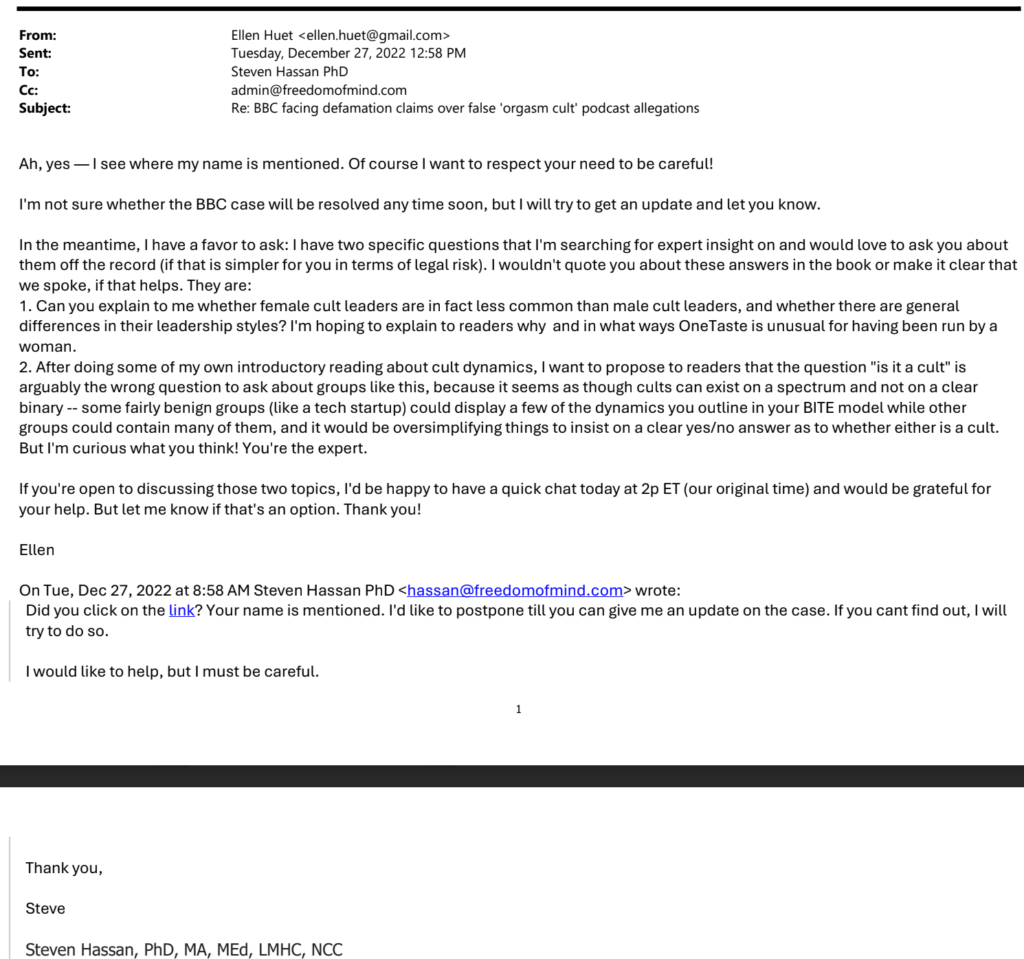
So let’s recap: the DOJ built its case on a podcast that featured Hassan as their expert voice, while that same guy was privately guiding the emotional and legal narratives of the two key witnesses and declining public comment out of fear of being sued.
That smells fishier than a tuna cannery in July. This wasn’t law enforcement. It was narrative laundering.
And the deeper you go, the clearer it becomes: this isn’t just about OneTaste.
It’s about how the language of therapy and activism has been transformed into a tool of federal prosecution. What does that mean, exactly? It means the government is using emotionally charged labels like “cult,” “coercion,” and “victim” to turn Trump Derangement Syndrome and #MeToo activism into lawfare predicates—and a wellness company’s legal fight may have just exposed the entire blueprint.
What began as an investigation into a wellness company’s unorthodox practices may now reveal something far more important: a blueprint for how the federal government defines and destroys those who challenge its narrative.
In 2017, OneTaste had hit its stride as a business. The company had been featured in major media, was generating over $12 million annually, and had served more than 35,000 customers. OneTaste was being widely praised in the mainstream media for its controversial approach to healing trauma and improving intimacy, including work with military veterans suffering from PTSD. For three years in a row, OneTaste appeared on Inc.’s list of fastest-growing companies, and the organization maintained a spotless public record, with no lawsuits, no police reports, and just one no-fault workplace settlement in over a decade. One might even say OneTaste was slowly becoming a darling of the left.
But then, everything began to shift.
Shortly after founder Nicole Daedone sold the company to a group of students-turned-owners, a law firm, DGG, led by Democrat operative Lanny Davis, recommended creating a privileged and confidential internal “Risk Assessment.” But DGG didn’t just suggest the document; they helped set it up. Their sister PR firm, Trident DMG, also introduced the company to Bloomberg journalist Ellen Huet, who would later go dark and then reappear with a bombshell takedown. Her article painted OneTaste not as a wellness organization, but as a prostitution ring. It labeled the company a criminal enterprise and was largely built around the stories of Michal and Ayries, former customers whose credibility, now that they’re linked to Steven Hassan and his cult narrative playbook, has come under serious scrutiny.
Many of the former staffers and community members say OneTaste resembled a kind of prostitution ring—one that exploited trauma victims and others searching for healing. In some members’ experiences, the company used flirtation and sex to lure emotionally vulnerable targets. It taught employees to work for free or cheap to show devotion. And managers frequently ordered staffers to have sex or OM with each other or with customers.
This type of media narrative triggered major moves: a federal investigation, follow-up coverage from other major media outlets, and later, a Netflix documentary and a BBC podcast.
But the deeper OneTaste dug through civil discovery and legal filings, the more troubling the story became. Evidence began to surface that the investigation wasn’t built on statutes or facts. It was being shaped around a dangerous narrative, one anchored in the cult rhetoric of a man named Steven Hassan.
The Cult Expert Behind the Curtain
To understand the foundation of the government’s case against OneTaste, we have to look at the influence of Steven Hassan, a self-proclaimed “cult expert.” Hassan developed what’s known as the BITE Model: short for Behavior, Information, Thought, and Emotional control. This term is used to describe how cults supposedly manipulate people. The FBI has adopted this BITE model as a tool to train agents in identifying potential victims of “coercive control.”
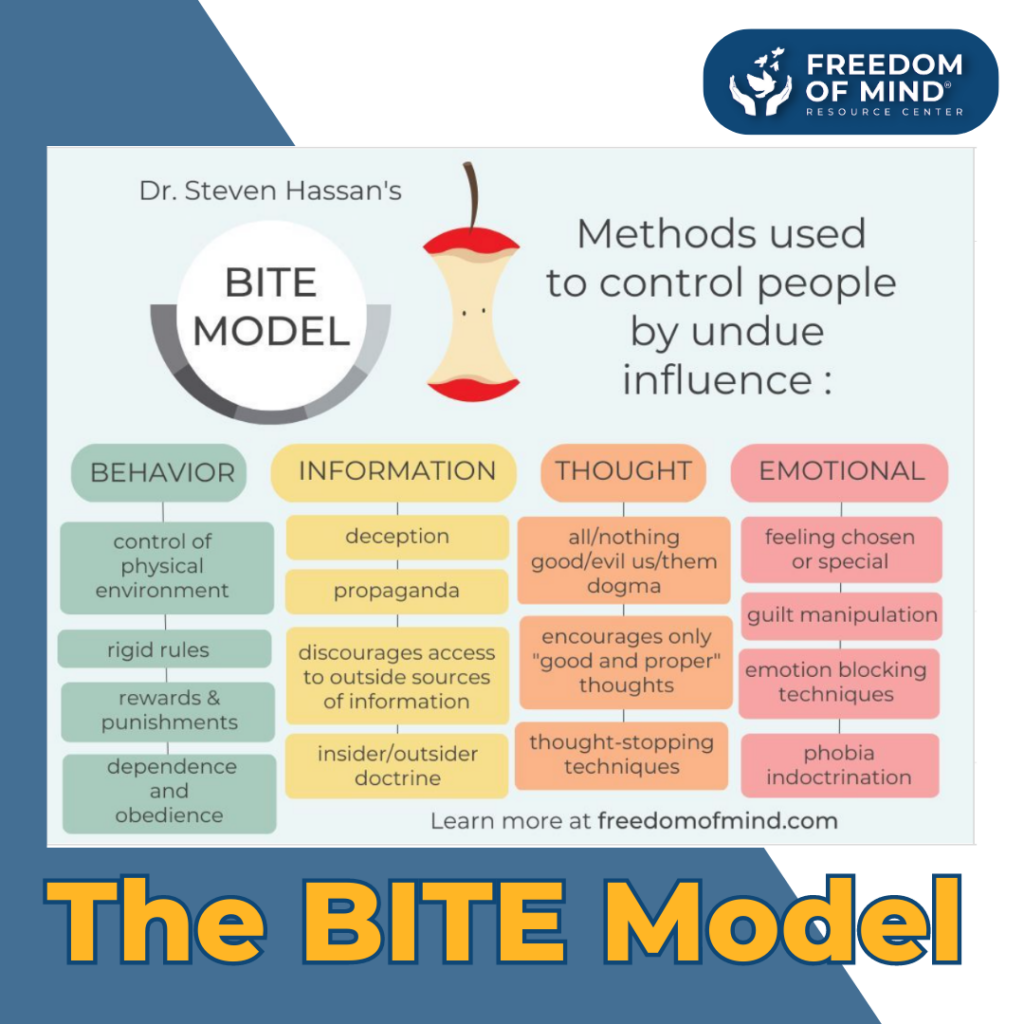
When applied to cases of sex trafficking and human trafficking, the BITE Model seems totally reasonable and even clinical. But when you actually look at what’s really inside each category, it starts to become clear how dangerously vague and easily weaponized this model really is if the DOJ decides it wants to apply it to perfectly lawful organizations like wellness companies, religious organizations, or even political movements.
I wrote The Cult of Trump in 2019. I predicted violence if he lost 2020 election. I told you New Apostolic Reformation is not Jesus centered Christianity- they are BITE Model authoritarian cults! Believe me now? https://t.co/sT4r1k3uhx
— Steven Hassan, PhD (@CultExpert) September 18, 2022
Behavior Control
This section includes things like controlling your daily schedule, restricting leisure time, and demanding obedience. That could describe a yoga retreat, a military training camp, or, honestly, working in corporate America. It’s so broad it’s pretty much meaningless without context.
Information Control
This one flags any group that discourages outside media or “unauthorized” viewpoints. Sounds reasonable, until you realize how absurdly broad that is. Religious groups, political campaigns, and even therapists sometimes advise filtering what you consume. Telling someone to avoid toxic people or ignore smear pieces can now be spun as “cult behavior” under this model.
Thought Control
This category claims that using loaded language, discouraging critical thinking, or instilling “us vs. them” mentalities is a red flag. If that’s the case, every political party, activist group, and cable news network in America is a cult.
Emotional Control
According to Hassan, this includes making people feel guilty, instilling irrational fears, or discouraging “negative” emotions. So if a group teaches emotional regulation or encourages self-accountability, is that abuse? Is a teacher or therapist now a cult leader?
And here’s the bigger problem: none of these criteria require proof of force, fraud, or actual harm. It all comes down to how someone feels, usually years later, about their experience. It’s not about evidence. It’s about interpretation, emotion, and “vibes.”
This is the model the FBI is using to train agents. And not so coincidentally, it’s also the same exact model now being used to reshape the memories of witnesses in the OneTaste case.
And when you look closer at Hassan’s work, his extreme bias becomes impossible to ignore.
So true, Dave. When researching my book, The Cult of Trump, It was obvious that Trump was the fruit of decades of intentional power mongering by wealthy, powerful cults and ideologies. I named Putin, The Family, Opus Dei, New Apostolic Reformation, Nazis.. https://t.co/l64PvkSlKs
— Steven Hassan, PhD (@CultExpert) November 18, 2021
As mentioned above, he’s the author of a book called The Cult of Trump, where he compares President Trump to notorious cult leaders and claims Trump’s supporters are basically brainwashed.
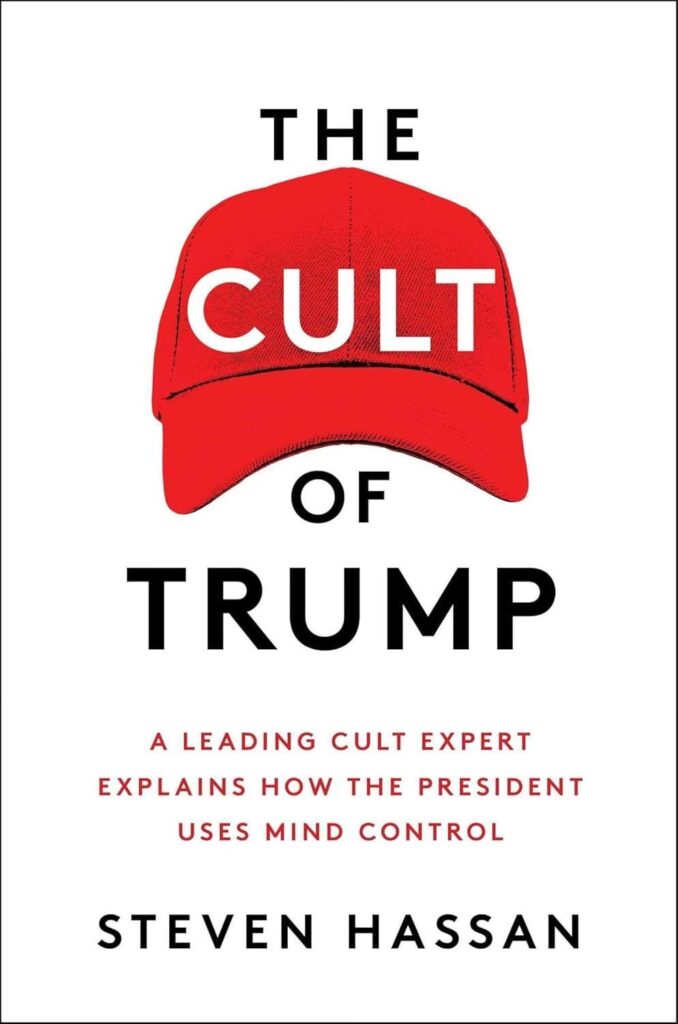
This raises serious concerns about Hassan’s objectivity. How can someone with views so blatantly shaped by political bias and Stage 5 Trump Derangement Syndrome be allowed to influence and shape the thinking of federal agents?
I wrote in my book, The Cult of Trump, about my fears of violence. Cult leaders are predictable. Many people need to be held accountable and need to be tried and sent to jail. Trump too!
— Steven Hassan, PhD (@CultExpert) January 6, 2021
Media Narratives Shaping Legal Actions
One of the clearest examples of how media and lawfare now walk hand-in-hand is the BBC podcast, The Orgasm Cult. In this series, Steven Hassan is featured applying his BITE Model to OneTaste, labeling it a cult and drawing these sweeping conclusions based on interviews and personal opinion, not legal standards. The series is now the subject of an active legal complaint by OneTaste, citing serious misrepresentations and ethical concerns.
And yet, federal prosecutors told OneTaste’s defense attorneys to listen to the podcast if they wanted to fully “understand the crime” being investigated.
According to court filings reviewed by Revolver, this all unfolded in December 2022, months before the indictment. At the time, OneTaste’s legal team was pushing the DOJ to clarify exactly what they were investigating. Federal prosecutor Gillian Kassner responded by telling them to “look to the media,” specifically pointing to the BBC podcast.
That’s not legal guidance. That’s narrative outsourcing. It’s like sending someone to a Dateline episode for legal advice.
And what’s even more astonishing is that Kassner was also the same prosecutor who abruptly quit the case just four weeks before trial, after being forced to admit that the so-called “Netflix journals” were fraudulent and that key witness Ayries Blanck had perjured herself.
Let’s just absorb what actually went down: the DOJ’s lead prosecutor relied on a podcast to shape a federal case—then bailed when the media-generated “evidence” collapsed in court.
After everything we’ve learned so far about OneTaste, in this episode we speak to cult expert Steve Hassan, author of Combatting Cult Mind Control, about what makes a cult – and whether he thinks the term applies to OneTaste.”
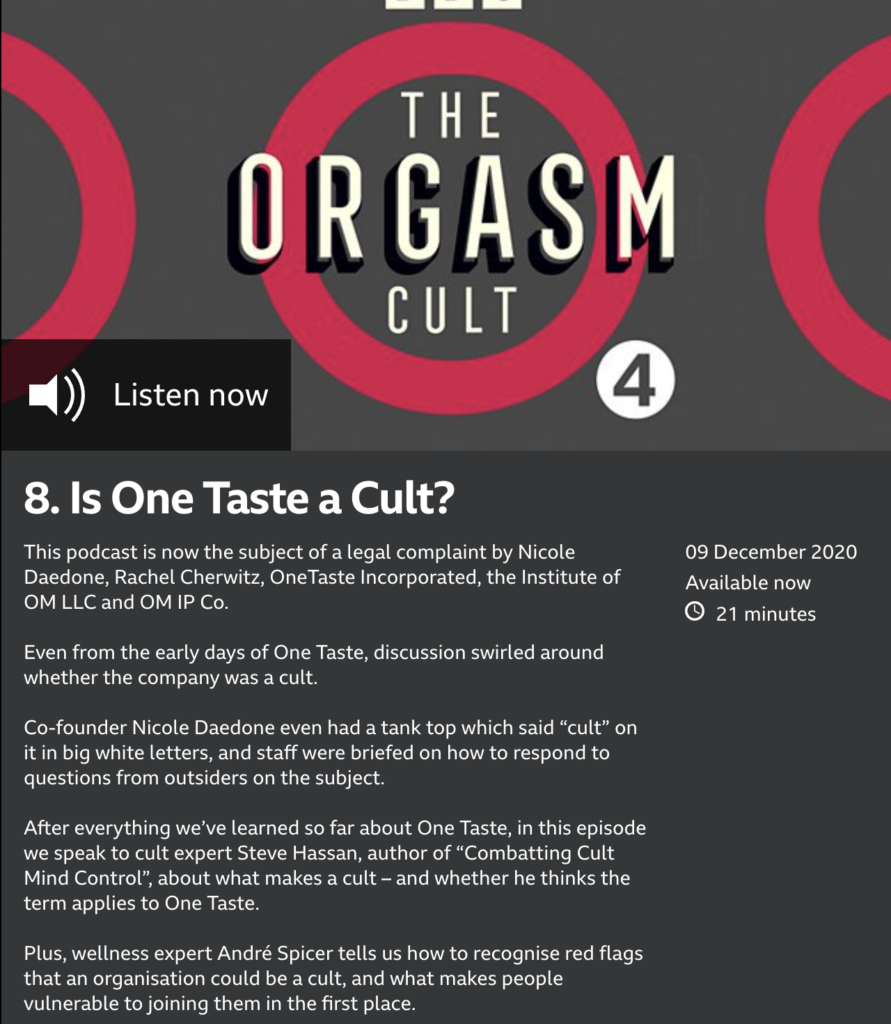
You can listen to the entire BBC podcast by clicking here.
It’s truly baffling and almost unbelievable that federal prosecutors would tell OneTaste’s defense attorneys to listen to a random podcast if they wanted to understand the crime being investigated.
Think about it. The DOJ didn’t point to a statute. They didn’t reference an indictment or cite some vast body of evidence. No, instead, they sent defense counsel to a BBC podcast. It was thus a media product, steeped in bias and packaged as entertainment, used to shape the very foundation of a federal criminal case.
Lunacy.
This isn’t just weaponization. It’s laziness. It’s activism masquerading as justice.
The Setup: How the Media Planted the Seeds of Lawfare
Before a single charge was filed, the public case against OneTaste was already moving full-steam ahead. It was carefully crafted through media leaks, planted stories, and behind-the-scenes PR moves.
It started with a gentle suggestion from DGG, the legal firm headed up by Democrat operative Lanny Davis. DGG was brought in to help OneTaste’s new ownership manage the transition after Nicole Daedone sold the company.
One of their recommendations was to commission an internal ‘Risk Assessment.’ The supposed goal was to “strike first” and get ahead of any potential “reputational” risks from false things people said about OneTaste. It was pitched as a good-faith, executive-team-driven exercise. But that document, protected under attorney-client privilege, would later become the FBI’s silver bullet.
Then came the journalist…
As we mentioned earlier, a writer from Bloomberg, who had been in direct contact with law firm DGG’s sister PR company, Trident DMG, published an exposé that framed OneTaste as a sex trafficking operation.
“Former staffers say they were ordered to have sex with customers. Salespeople were taught to exploit trauma and insecurities to close deals. The goal, some former employees say, was to make money and satisfy the sexual appetites of the company’s leaders.”
That article blew the narrative wide open. And it didn’t stop there. It was quickly followed by similar bombshell pieces in Playboy, VICE, the BBC podcast, and eventually a Netflix documentary. The message was loud and clear: OneTaste wasn’t a wellness company; it was a cult, a scam, a front for exploitation.
But what those outlets didn’t tell you reveals an even bigger story.
It turns out the Bloomberg reporter had once been roommates with a former OneTaste employee who had personal grievances with the company.
S
It gets messier.
That same former employee, Ayries Blanck, later appeared in many media outlets under different names, even though she signed a confidential settlement agreement years earlier. Not long after, she launched a media production company so she could market a television series based on her version of events inside OneTaste.
From there, everything snowballed out of control.
Netflix producers smelled a hit. Lena Dunham and Sarah Gibson teamed up to cash in, pitching a show that vilified Nicole Daedone—despite having previously praised her work. Around the same time, the BBC launched The Orgasm Cult podcast, leaning heavily on Steven Hassan’s talking points, ideological bias, and unchecked speculation.
What was unfolding was not investigative journalism. It was character assassination backed by powerful cultural voices, funded by media platforms, and designed to shape a criminal case before it ever reached a courtroom.
Welcome to the ground zero of the left’s lawfare game.
Fake Journals, Netflix Drama, and FBI Coordination
What came next was even more disturbing.
After years of carefully building this biased, fake narrative, Netflix began production on its OneTaste documentary. But behind the scenes, evidence was emerging that the narrative wasn’t just being shaped; it was actually being fabricated.
Ayries Blanck, the same former OneTaste employee at the center of all those media stories, allegedly produced a set of handwritten journals packed with new, graphic, and conveniently “Netflix-worthy” claims. These journals had never been mentioned before. The language didn’t match her previous communications. The handwriting didn’t match either.

S
Something was off…
But that didn’t stop Netflix. The journals still became a focal point for the production.
Blanck’s sister was reportedly paid $25,000 by Lena Dunham to read excerpts from the journals for the Netflix production. According to OneTaste’s legal team, the journals were revised many times and edited with input from Netflix producers, as well as FBI Agent Elliot McGinnis, who was already deeply entrenched in the federal investigation.
This wasn’t documentary filmmaking.
It was a coordinated media/government hit, blurring the line between storytelling and federal prosecutions.
Netflix never backed down. Even after OneTaste fired off more than a dozen legal warnings, they plowed ahead with production. The film finally aired in November 2022. What started as a full-blown scripted television series from Lena Dunham quietly shrank into a documentary film after a slew of key content had to be cut under legal pressure.
Everything was built on narrative.
All of it tied to the same cast of characters.
And every frame was dripping with federal fingerprints.
The FBI Gets Its Hands Dirty
While Netflix and the BBC were busy shaping public opinion, with the help of Steven Hassan, the FBI was shaping something else: its case. And it wasn’t built on evidence. It was built on access.
According to legal filings and discovery materials reviewed by Revolver, FBI Agent Elliot McGinnis became personally involved in the OneTaste investigation. In one of the most alarming moments of the case, a former IT employee, who had hacked into OneTaste’s systems and stolen internal documents, was contacted directly by Agent McGinnis.
Among the stolen files was the so-called “Risk Assessment” report. Despite being marked as attorney–client privileged, McGinnis allegedly took possession of the document on the spot and used it as part of the ongoing federal investigation.
Why did an FBI agent visit this person?
Who tipped him off?
And why did the government never disclose the document during discovery?
To this day, the DOJ has never answered these very important questions.
But it doesn’t end there…
Through civil litigation, OneTaste got their hands on emails showing McGinnis telling witnesses to delete evidence. He was also named in a deposition where a witness testified that he asked for her sister Ayries Blanck’s now demonstrably fraudulent journals to be shipped to him so they wouldn’t have to be turned over during court proceedings.
But the most revealing piece of all wasn’t in any of the paperwork. It came straight from the mouth of the government’s own lead witness, under oath.
“I don’t regret my time at OneTaste,” the government’s first witness said under oath. “I said things in those interviews that I was encouraged to say… I missed the people. I missed Nicole. I never felt unsafe.”
That same witness had been interviewed by the FBI more than ten times, a highly unusual number in any case involving alleged victimization. Her original statements to investigators made no mention of coercion or psychological control. But over time, her testimony changed, and so did her language.
By the time she appeared in court, she was speaking in the same terms Steven Hassan uses in his lectures.
How the FBI Codifies Victimhood
By the time OneTaste got to trial, it was clear the case wasn’t built on traditional evidence. It was built on emotion, vibes, and Steven Hassan’s cult ideology—and the DOJ made no secret of it.
In an article published in the FBI’s own Law Enforcement Bulletin, the agency lays out its “victim-centered” strategy for how it builds sex trafficking cases. The model focuses on trauma narratives, encourages prosecutors to see survivors as fragile and emotionally unaware of their own abuse, and also suggests that “grooming” can include consensual relationships that are later reinterpreted through a new psychological lens.
Victims may not view themselves as victims… Traffickers often exploit their victims’ basic needs for love, attention, or safety… Law enforcement should view initial resistance or denial as symptoms of trauma, not indicators of a false report.
To sum it up: if someone says they weren’t trafficked, the FBI may treat that denial as proof that they were.
And this is where the dots really start to connect…
That dangerous mindset fits perfectly with Steven Hassan’s BITE Model, which reinterprets free will as mind control and emotional bonds as evidence of abuse. This creates a framework that allows prosecutors to redefine past choices as criminal coercion, even if the person making those choices completely and totally disagrees.
Do you see how deeply disturbing this is? Steven Hassan’s extreme ideological views aren’t just influencing public perception; they’re helping build the foundation for some of the flimsiest, yet most aggressive, lawfare we’ve seen in modern history.
That isn’t justice. It’s ideology on trial.
When the Case Finally Came, It Wasn’t What Anyone Expected
After five long years of salacious media coverage filled with words like cult, sex trafficking, and abuse, the actual indictment landed with a big ol’ thud.
There were no charges for sex trafficking.
No charges for sexual misconduct.
No charges for coercion or abuse.
Instead, OneTaste was indicted on a single count: conspiracy to commit forced labor. A charge so incredibly rare, so extremely broad, and so loosely defined that it has never before been used in this way.
And yet, this was the government’s big case.
This obscure single charge was the result of five years of federal resources, media coordination, and behind-the-scenes pressure.
According to prosecutors, this flimsy, so-called “forced labor conspiracy” charge involved adults who had willingly worked for a company, all of whom had actually signed contracts, been paid, and later left on good terms.
The government’s theory was that emotional or spiritual influence somehow crossed an invisible line and turned employment into slavery. Of course, that line was never clearly defined. And no one realized that line was crossed until after they left OneTaste and got in the hands of Hassan and FBI victim services agents. But that didn’t seem to matter to anybody.
But that’s okay, because by the time the indictment came down in April 2023, the narrative had already done its job.
Netflix had aired its documentary. BBC had run its podcast. The term “sex cult” was etched into the public psyche. And Steven Hassan’s ideology had been quietly codified into the federal process, used to justify what couldn’t be proven with facts or evidence.
When “Hurt Feelings” Become a Federal Case
Traditionally, cases prosecuted under the Trafficking Victims Protection Act of 2000 have required the government to prove a “serious harm” element in any forced labor conspiracy. As outlined in a defense letter to the trial judge, this standard is grounded in actual threats of harm, physical, financial, or otherwise, not vague emotional discomfort or hurt feelings. That standard exists for a reason: it protects the civil liberties of Americans from creative, overreaching prosecutions. But in the OneTaste case, the government is attempting to stretch the definition of “serious harm” to include nebulous negative emotional experiences, a dangerous shift that threatens to untether federal law from objective reality.
Untethering the statute from a serious harm requirement opens the door for the government to go after disfavored groups it doesn’t like. After all, the government is now prosecuting OneTaste for recruiting “vulnerable” individuals with promises of salvation and enlightenment, collecting donations from them, and enlisting them as volunteers. But that description doesn’t just apply to wellness groups, does it? No. It applies to most major religions on the planet. And not just religions, but political movements too. Think about MAGA, the Obama campaign, or the Bernie Sanders movement: these political movements promise to solve people’s problems while enlisting millions as donors and volunteers.
The “BITE” model might seem reasonable in cases involving actual underlying crimes like sex trafficking or forced labor. But applying it to spiritual groups, and now, political or wellness movements, opens the door for serious abuse. The slope from “cult” to religion to political movement is not just slippery, it’s engineered. After all, political parties get supporters emotionally invested, keep them donating, and demand significant time and loyalty. By Hassan’s logic, are major campaigns or activist movements now “forced labor conspiracies”?
Legal experts have long rejected the concept of “brainwashing” as a credible basis for prosecution, and yet Hassan’s “BITE” model appears to be reviving this discredited framework under a new label. It’s less a tool for justice and more a blueprint for installing the therapist state, where subjective feelings override facts and ideological alignment determines guilt.
And yet, this is the same model being promoted by a self-described cult expert who has publicly compared Trump and his supporters to brainwashed followers. That alone should raise serious questions about bias, lawfare, and the growing use of psychological frameworks to criminalize political dissent.
This so-called “expert” even took to X and claimed President Trump was the head of a “death cult.”
Trump is the head of a death cult. People are dying and disbelieving COVID-19 is real. Tomorrow is anniversary of Jonestown massacre of over 900 including 300 children. I implore the media to act responsibly. Stop amplifying disinformation and attempts to divert. #iGotOut. You? pic.twitter.com/0oXfVLSuiR
— Steven Hassan, PhD (@CultExpert) November 17, 2020
We just had four years of the FBI targeting Trump supporters and religious conservatives. The OneTaste prosecution lays the predicate for the Bureau to ramp up its persecution of Trump supporters and Christians the moment Trump walks out of the Oval Office.
Do you think the Biden holdovers and career bureaucrats embedded in the deep state wouldn’t love to prosecute Donald J. Trump?
What would the government’s “cult expert,” Steven Hassan, have to say about that?
Here’s Mr. Hassan cheering on the erosion of free speech and suggesting it’s time to “help” radicalized Trump supporters.
The violence incited by Trump was predicted in The Cult of Trump. Please remove his power! Glad he was booted of Twitter, FB, Parler too shut down. Media are reaching out to me now. It is time for educational effort to teach the mechanics of how to radicalize and help people out! pic.twitter.com/Htqt842JHv
— Steven Hassan, PhD (@CultExpert) January 12, 2021
What This Case Is Really About
The case against OneTaste was never about public safety. It wasn’t about protecting victims. And it certainly wasn’t about enforcing any clear legal standard or upholding any actual laws.
It’s about control.
The left’s new lawfare playbook doesn’t need things like pesky solid evidence. It just needs a “cult expert,” a few media allies, and a federal agency willing to outsource its judgment to whack-a-doodle ideology.
In Steven Hassan’s world, free will is a myth. If someone says they weren’t manipulated, he believes that’s part of the manipulation. If someone supports Trump, they’re brainwashed. If someone joins an unconventional spiritual or business community, they’re a victim, even if they don’t think they are.
The FBI has adopted that mindset. And now, it’s using it to create victims where none actually existed, redefine past choices as crimes, and turn ideology into prosecution.
OneTaste was a test case. A soft target. A dry run for something bigger. And thanks to the fight taken on by the company—who refused to fold and dragged the truth out piece by piece through civil litigation—we now have a clear view of the lawfare blueprint.
A radical activist named Steven Hassan, driven by a vendetta against Trump, is training the FBI to define what counts as a “cult.”
That same ideology is now embedded in federal investigations, courtrooms, and prosecutions.
If they can do it to OneTaste, they can do it to anyone.
You can follow our live blog for updates on the ongoing trial.
Annual Ad-Free Subscription… Join the Fight and Support Revolver Now…
Check out the new merch! — Donate…
Sign up for our email list… Stay on the bleeding edge…
NEWSFEED — FOLLOW ON X — GAB — GETTR — TRUTH SOCIAL — BLUESKY




